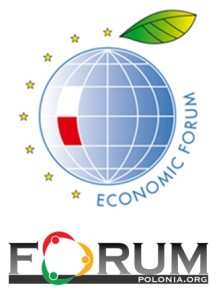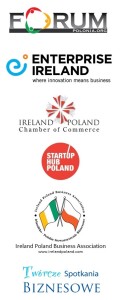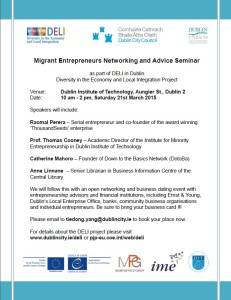Do you live in Ireland? Do Polbusiness with us!
Are you a Polish entrepreneur working in Ireland? Perhaps you are planning to start your own business? Or maybe you wish to change the profile of your company and start something new?
The Polbusiness training is what you are looking for!
The Foundation Institute for Eastern Studies based in Warsaw, Forum Polonia and other partners invite you to participate in a 3-day long training course on doing business in the Republic of Ireland. The series of training seminars aims to support the functioning of your company in the receiving country, as well as facilitate contacts with potential business partners and institutions in Poland. The trainings will be conducted by Irish experts as well as the Polish partners of the project. Each session will be devoted to a different issue: from basic legal regulations, to industry secrets and alternative business patterns. The trainings will take on different forms: analyzing case studies, workshops, competency tests. A more detailed programme is provided below.
In order to participate in the training please fill in the registration form which is available on the following website: http://www.forum-ekonomiczne.pl/polbusiness/
The training will take place on 11-13 June 2015 in Dublin. You can apply until 29th May.
The Polbusiness project is co-financed by the Department of Public and Cultural Diplomacy of the Ministry of Foreign Affairs within the framework of a competition “Cooperation in the field of public diplomacy 2015”
Programme
The sessions of the training will evolve around the following themes (8):
Day 1
- Basic legal regulations, legal and financial assistance in starting a business (4h)
At the beginning of the seminar the participants will familiarize themselves with the British/Irish law that regulates the basic aspects of running a business. They will learn about the opportunities and obligations that result from the legal requirements. Furthermore, they will be informed about the potential tax advantages as well as legal and financial assistance opportunities they can benefit from. They will also learn where and how to apply for such assistance.
- Business culture in the United Kingdom/Ireland (4h)
The following issues will be discussed during this part of the training:
- the reasons for organising cultural trainings in companies
- characteristics of the country – United Kingdom/Ireland
- the most important aspects of British/Irish culture
- British/Irish business etiquette
Day 2
- Retail and sales (4h)
This part of the training will focus on effective sales strategies, including the following points:
- Professionalism in retail
- Creating the image of a competent consultant
- First contact and sales pitch
- Sales conversation
- Identification – customer personality types
- IT and new technologies (4h)
Information technologies play a very important role in modern businesses, as they are present in virtually every aspect of their functioning. This fact is proved, for instance, by the investments in IT, which often take up more than a half of the investment budget in many enterprises. At the same time, very often they do not bring the expected results. That is why such investments need to be systematized in order to maximize the value of the enterprise. The participants of the training will learn about the concept of IT Governance, which encompasses the following: strategic alignment, value delivery, resource management, performance management and risk management. Thanks to applying IT Governance a business is can use the data it has in the most effective way and maximize the gains that come from them.
Day 3
- Media and culture and alternative business (4h)
The training aims to consolidate and extend the knowledge about the new media, together with presenting the newest trends, innovations and tools of internet communication.
Among others, the following themes will be touched upon during the training:
- Internet portal
- Serach engine and positioning
- Internet commercials
- Social media
- Blogosphere
- Managing internet communication
In the second part of the session the participants will learn:
- How to expand their business in an honest and ethical way.
- How to become a perfect salesperson/networker.
- How to create a dynamic, powerful MLM structure.
- How to make a great global MLM business.
- How to motivate and not manipulate their co-workers.
- International Trade and Cooperation with business institutions in Poland (4h)
The participants taking part in this seminar will obtain complex knowledge and skills pertaining to launching, as well as running sales on new, attractive foreign markets. They will be able to answer the following questions: how to choose the right destinations, build the right strategy, effectively promote and sell products on foreign markets, successfully negotiate and secure trade contracts.
The Project participants will obtain knowledge about the possibilities and benefits from maintaining contact, as well as partnership with business institutions in Poland. The models and examples of launching such cooperation, together with basic, practical information pertaining to effective partnership proceedings will be presented during the training.
The seminar leaders will contribute to the creation of a report covering all the seminar sessions from the programme. This report will then be presented during the Economic Forum in Krynica-Zdrój in September 2015 and the Congress of Polish Entrepreneurs in London in October 2015.
Partners of the Project




 Responding to the pamphlet entitled “Hidden Messages/Overt Agendas” written by Niall Crowley and published by the Migrant Rights Centre the Minister for Integration, Mr. John Curran T.D., said: “Normally I welcome contributions to the debate as I believe it is only by discussion and debate that we can, as a society, deal with the challenges posed to Irish and non Irish alike. Unfortunately, for reasons I will make clear I cannot afford a welcome to this contribution as I believe there are such omissions as to render the pamphlet seriously flawed.
Responding to the pamphlet entitled “Hidden Messages/Overt Agendas” written by Niall Crowley and published by the Migrant Rights Centre the Minister for Integration, Mr. John Curran T.D., said: “Normally I welcome contributions to the debate as I believe it is only by discussion and debate that we can, as a society, deal with the challenges posed to Irish and non Irish alike. Unfortunately, for reasons I will make clear I cannot afford a welcome to this contribution as I believe there are such omissions as to render the pamphlet seriously flawed.